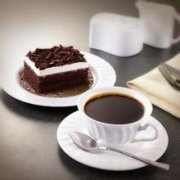A brief introduction to the History and Culture of the Origin and Development of excellent Jamaican Coffee

Coffee beans that generally grow at low elevations and other areas can only be called "Jamaican mountain beans" or "Jamaican waterwashed beans". Compared with the Jamaican Blue Mountains, they have a lot of flavor, but, these producing areas are twice the size of the real blue mountain areas, and the output accounts for 75% of the country's output, so when you buy Jamaican coffee, don't think you bought blue mountain coffee.
Because Jamaica Blue Mountain is so famous, there are fake Blue Mountain Coffee on the market, or simply called "Blue Mountain Coffee". It is basically a comprehensive product prepared by the store. there may not be a real Jamaican blue bean in it.
History editor
In 1717 King Louis XV of France ordered the cultivation of coffee in Jamaica for twenty years.
Blue Mountain Coffee
Blue Mountain Coffee (6)
In the mid-1970s, the Governor of Jamaica, Sir Nicholas Lloyd (Nicholas Lawes), imported Arabica seeds from Martinique and began to plant them in St. Andrew. To this day, St. Andrews is still one of the three major producers of Jamaican Blue Mountain Coffee, with the other two producing areas: Portland (Portland) and St. Thomas (St.Thomas). In eight years, Jamaica exported more than 375 tons of pure coffee. In 1932, coffee production reached its peak and more than 15000 tons of coffee was harvested.
In 1950, the Government of Jamaica established the Jamaica Coffee Industry Committee (the Jamaica Coffee Industry Board), which sets quality standards for Jamaican coffee and oversees the implementation of quality standards to ensure the quality of Jamaican coffee. The Commission awarded special official seals to raw and roasted coffee exported from Jamaica, which is the highest-level national coffee institution in the world. The origin of Blue Mountain Coffee can be represented by Mavis Bank Coffee Factory (M.B.C.F), Blue Mountain Coffee Co-operative Factory (M.H.C.C.T.), Portland Blue Mountain Coffee Cooperative Factory (P.X.X.S.H.), Coffee Industry Association (Wallenford), Coffee Industry Association (St. John Peak) and J.A.S.
By 1969, the situation had improved because the use of Japanese loans had improved the quality of production, thus ensuring the market. By now, this kind of coffee has reached the point of being feverishly loved.
By 1981, about 1500 hectares of land in Jamaica had been reclaimed for coffee cultivation, followed by the opening of another 6000 hectares of coffee land. In fact, today's Blue Mountain area is a small area with a planting area of only 6000 hectares, and it is impossible to grow all the coffee marked "Blue Mountain" there. Another 12000 hectares are used to grow two other types of coffee: Alpine Top Coffee and Jamaican Superior Coffee.
Geographic editing
The Blue Mountains of Jamaica
The Blue Mountains of Jamaica
Blue Mountain Coffee is the most superior coffee in the world, and the weather, geological structure and topography of Jamaica provide an ideal place. The ridge that runs through Jamaica extends to the eastern part of the island, with the Blue Mountains rising to more than 2100 meters. Cool weather, foggy, frequent precipitation, use this rich soil Rain Water to reconcile. Here, a mixed planting method is used to grow coffee trees to accompany banana trees and avocado trees on terraces. Some small estates are also planted. But even the largest landowners in the region are small-scale growers by international standards, many of whom are small landowners whose families have been working for two centuries. The coffee industry in Jamaica faces a series of problems, such as the impact of hurricanes, increased labor costs and difficult mechanization of terraces. It is difficult to rationalize planting on many small estates and farms
Blue Mountain Coffee is one of the most advantageous coffee growing conditions in the world. Jamaica's weather, geological structure and topography provide a unique ideal place. The ridge that runs through Jamaica extends to the eastern part of the island, with the Blue Mountains rising to more than 2100 meters. Cool weather, foggy, frequent precipitation, use this rich soil Rain Water to reconcile. Here, a mixed planting method is used to grow coffee trees to accompany banana trees and avocado trees on terraces.
Some small estates also grow Blue Mountain Coffee, such as Wallenford Estarte, Silver Hill Eatate, and J. Martinez) Atlanta Manor (Atlantn Estate), etc. Even the largest landowners in the region are small-scale growers by international standards, many of whom are small landowners whose families have been working on the land for two centuries. The coffee industry in Jamaica faces a series of problems, such as the impact of hurricanes, increased labor costs and difficult mechanization of terraces. It is difficult to rationalize planting on many small estates and farms.
Jamaican Blue Mountain Coffee, however, Blue Mountain Coffee is a coffee that coffee retailers that value credibility need to stock up anyway. The major retailer in the UK said: no matter what the price, he will continue to sell Blue Mountain coffee all year round because he has many customers who only recognize "Blue Mountain".
As Japan has always invested in the Jamaican coffee industry, the cultivation of Blue Mountain Coffee is now mostly controlled by the Japanese, and there is no doubt that they have also won the right of priority to buy Blue Mountain Coffee. In 1992, Jamaica sold 688 tons of Blue Mountain coffee to Japan, 75 tons to the United States and 59 tons to Britain. Now, 90% of the harvested Blue Mountain coffee is bought by the Japanese. Now that the rest of the world can only get 10% of Blue Mountain, Blue Mountain coffee is always in short supply, regardless of the price. In the UK, Langford Brothers Brothers has been the only supplier for many years. Later, the Edmunds Group (Edmonds Group) also received a supply from Jamaica's Salda Food Company (Salda Foods).
The difference in transportation between Blue Mountain Coffee and other coffee is that it is transported in a 70kg barrel, a replica of the Bonifieur barrel made in Guadeloupe's Bug Century, which was originally used to carry flour from England to Jamaica, usually with a trademark and the name of the manufacturer. The Coffee Industry Council issues certificates for all authentic Jamaican coffee and stamps the exporters with approval stamps.
The Jamaican government used to insist that all Blue Mountain coffee is roasted in Jamaica to ensure that the quality remains the same. In fact, baking is a fine art, and it takes experience, training and expensive facilities to do a good job. From the consumer's point of view, coffee beans should be obtained and drunk immediately after baking. Coffee roasting in Jamaica is unlikely to meet this requirement. Now the raw coffee beans of Jamaica can be exported.
When it comes to Jamaica, everyone's eyes lit up immediately, because it produced the best "Jamaican Blue Mountain Coffee" (Jamaica Blue Mountain) in the world. We absolutely believe that Jamaica Blue Mountain Coffee is the best coffee, its acid, sugar, alcohol and bitterness are well balanced, fragrant and smooth to drink, but its price is so high that although it is worth a try, there is no need to be fascinated by it. Because other selected coffee also has its own characteristics, and the taste is delicious, the price is also reasonable, this is the good coffee in our life.
The earliest "Jamaican Blue Mountain" refers to the coffee produced by "Warren Ford Farm" and "Silver Hill Farm", with the former of the best quality; today, the Jamaican Blue Mountain refers to coffee beans growing in the Blue Mountain area (more than 1000 meters high) east of Kingston, the capital of Jamaica. Now Mawei is the largest manor, its barrel is printed with M.B.C.F, and its products are often found in Taiwan. The quality control of the Blue Mountains in Jamaica is very strict, and the certification work is carried out by the government's "Coffee Industry Committee".
Important Notice :
前街咖啡 FrontStreet Coffee has moved to new addredd:
FrontStreet Coffee Address: 315,Donghua East Road,GuangZhou
Tel:020 38364473
- Prev

A brief introduction to the flavor and aroma characteristics of Jamaican boutique coffee Blue Mountain Coffee
But by 1948, the quality of coffee had declined and Canadian buyers refused to renew their contracts, so the Jamaican government set up the Coffee Industry Committee to save the fate of top coffee. By 1969, the situation had improved because the use of Japanese loans improved the quality of production, thus ensuring the market
- Next

A brief introduction to the transaction Price of the aromatic Jamaican Coffee Variety planting Market
Because Jamaica Blue Mountain is so famous, there are fake Blue Mountain Coffee, or simply Blue Mountain Coffee, which is basically a comprehensive product prepared by the shop. there may not be a single real Jamaican blue mountain bean in it, which was ordered by King Louis XV of France in 1717 to grow coffee in Jamaica, 20 years Blue Mountain Coffee (6) mid-generation.
Related
- Detailed explanation of Jadeite planting Land in Panamanian Jadeite Manor introduction to the grading system of Jadeite competitive bidding, Red bid, Green bid and Rose Summer
- Story of Coffee planting in Brenka region of Costa Rica Stonehenge Manor anaerobic heavy honey treatment of flavor mouth
- What's on the barrel of Blue Mountain Coffee beans?
- Can American coffee also pull flowers? How to use hot American style to pull out a good-looking pattern?
- Can you make a cold extract with coffee beans? What is the right proportion for cold-extracted coffee formula?
- Indonesian PWN Gold Mandrine Coffee Origin Features Flavor How to Chong? Mandolin coffee is American.
- A brief introduction to the flavor characteristics of Brazilian yellow bourbon coffee beans
- What is the effect of different water quality on the flavor of cold-extracted coffee? What kind of water is best for brewing coffee?
- Why do you think of Rose Summer whenever you mention Panamanian coffee?
- Introduction to the characteristics of authentic blue mountain coffee bean producing areas? What is the CIB Coffee Authority in Jamaica?

